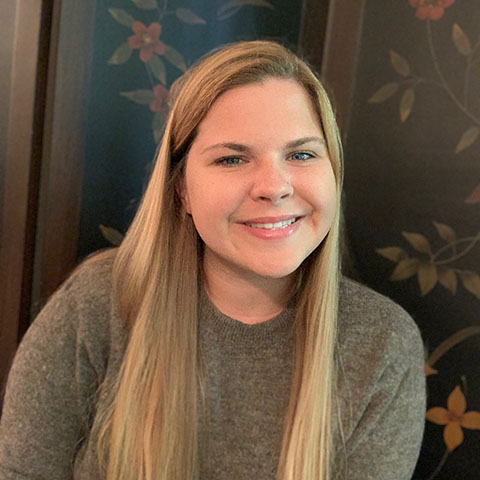BMMB Features: Kelly Rios
The Biochemistry and Molecular Biology (BMB) Department is fortunate to have a multitude of exceptional graduate students within its Biochemistry, Microbiology and Molecular Biology (BMMB) Program dedicated to developing their research and teaching skills. Our students are making discoveries and generating independent knowledge through their research within our labs.

Meet KellyRios, a graduate student working towards her Ph.D. in the BMMB Program. She has always had a natural curiosity regarding science, the world, and how they work together. It wasn’t until high school though that Kelly really began to develop an enthusiasm and passion for science. “I had wonderful, enthusiastic teachers that really conveyed how vast the science fields are, and how much there is to know,” said Kelly. These teachers, and their enthusiasm, instilled in Kelly a sense of wonder at how much there is to learn and discover that resonated with her.
That sense of wonder led Kelly to attend Siena College, a private Franciscan liberal arts college in Loudonville, New York, where she earned her Bachelor’s of Science degree in Biology. In deciding where to continue her education, and pursue her Ph.D, she only needed to visit Penn State’s University Park Campus to know that it was where she belonged. “It was very obvious that there is a real collaborative environment at Penn State, and that really appealed to me,” says Kelly. Penn State offered opportunities, in the form of its many research centers, that fostered a positive and supportive community where Kelly knew she could learn various topics, as well as share her research and receive feedback. “I knew I wanted to study parasitology, and Penn State had many faculty working on all different aspects of malaria biology, from vector biology to gene regulation,” says Kelly. “I knew I would end up in a great lab at Penn State.”

Kelly was right and found her way to the laboratory of Associate Professor of Biochemistry and Molecular Biology, Scott Lindner. The Lindner Laboratory’s work couples molecular parasitology and structural biology to understand the malaria parasite (Plasmodium spp.), to identify and exploit weaknesses in the parasite’s development and transmission. Kelly’s research within the laboratory investigates how post- transcriptional gene regulation contributes to malaria parasite transmission. Within the transmission stages of the parasite, many mRNA transcripts are proactively made, then protected from degradation or translation until transmission occurs. This process is called translational repression and if disrupted, parasite transmission cannot efficiently occur.
The translational repression of specific transcripts enables a rapid translational response upon transmission, which allows the parasite to establish itself within the new host or vector. Using proximity-dependent proteomics and super resolution microscopy techniques, Kelly is investigating how a particular mRNA-protein complex, the DOZI/CITH/ALBA complex, contributes to translational repression in transmission stage parasites.
Her research is integral to the laboratory’s overall goal of understand the fundamental molecular biology of the parasite in order to exploit weaknesses in transmission biology. With the knowledge of what is essential for transmission, the Lindner Laboratory can devise strategies for transmission blocking therapeutics or vaccines. These therapeutics and vaccines will block the transmission of the malaria parasite to naïve hosts, preventing the spread of malaria and aiding in eradicating of the disease.

When Kelly’s not in the laboratory, you can find her either on the hiking trial or pursuing her passion for art. She finds hiking allows her the ability to get some fresh air and allows her to decompress from her time spent in the laboratory. She wants to remind readers that there are many great trails to discover in, and near, the State College area to explore and discover.

When Kelly was younger, she spent a lot of time behind the canvas painting. She enjoyed painting because it resulted in an end product and provided her with a way to showcase her creativity. Over the year’s life began to get in the way, and Kelly fell away from painting. More recently, since entering graduate school, she has reignited her interest and began painting again. “it is so important for your mental health to have hobbies and interests outside of work,” says Kelly. “Painting provides me a creative outlet, helps me to decompress, and is completely separate from my work in the lab.”
Kelly is also active in several student organizations on the Penn State Campus such as the Center for Disease Dynamics Graduate Student Association and the Huck Graduate Student Advisory Committee (HGSAC). In her involvement in HGSAC she has had the opportunity to do things such as coordinate on campus career exposure seminars for graduate students. These seminars provide students an opportunity to learn more about non-academic career tracks. Additionally, Kelly has assisted with HGSAC’s annual life Science Symposium. The symposium is completely student-run, allows students a venue to present their research and encourages collaboration and sharing across the Penn State Community.
Kelly, like many of our graduate students, serves as an example of how many scientists display an inherent creativity. Her ability and desire to pursue her creativity, both inside and outside of the laboratory, provides her the opportunity to view issues from different perspectives and allows her the ability to develop creative ways to identify solutions. The Department is very fortunate to have Kelly as a part of its Team and looks forward to following her career. Congratulations Kelly for serving as an example of why We Are Penn State!